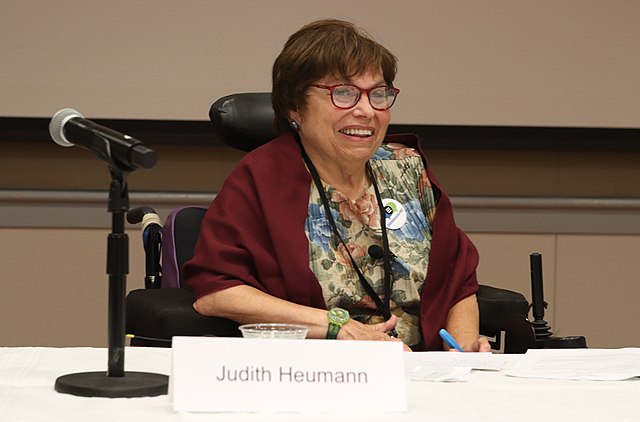“Disability only becomes a tragedy when society fails to provide the things we need to lead our lives—job opportunities or barrier-free buildings, for example,” Heumann told one reporter.
By Julia Conley. Published 3-6-2023 by Common Dreams

Judy Heumann as a panelist at TASH’s Outstanding Leadership in Disability Law Symposium and Awards Dinner, George Washington University’s Marvin Center, July 25 2019. Photo: Taylordw/Wikimedia Commons/CC
Disability rights advocates were joined by labor leaders, progressive politicians, and other advocates for justice on Monday in mourning the death of influential activist Judy Heumann, who began decades of advocacy work fighting for employment as a teacher and was credited with paving the way for numerous federal laws to protect people with disabilities. She was 75 and died on March 4.
Known as the “mother of the disability rights movement,” Heumann’s first experience with advocacy work came in 1970 after she was denied employment at a New York City public school, with the school citing her “paralysis of both lower extremities” as the reason and saying she would not be able to evacuate students and herself in case of a fire.
The denial harkened back to her treatment as a young child, when a school principal stopped Heumann’s mother from enrolling her in kindergarten and said her wheelchair—which she used as a result of contracting polio at 18 months—rendered her a “fire hazard.”
Heumann sued the New York City school district and won her case, becoming the city’s first teacher who used a wheelchair and drawing national attention to the issue of discrimination against people with disabilities. One newspaper ran an article about the case titled, “You Can Be President, Not Teacher, with Polio,” in which Heumann told the outlet, “We’re not going to let a hypocritical society give us a token education and then bury us.”
“Disability only becomes a tragedy when society fails to provide the things we need to lead our lives—job opportunities or barrier-free buildings, for example,” she told journalist Joseph Shapiro years later. “It is not a tragedy to me that I’m living in a wheelchair.”
Seven years later Heumann led more than 100 people in San Francisco in joining nationwide protests to demand that President Jimmy Carter’s health, education, and welfare secretary, James Califano, implement a crucial statute within the 1973 Rehabilitation Act.
The law had been signed by President Richard Nixon and included Section 504, which prohibited institutions that receive federal funding from discriminating against disabled people. Califano delayed implementing the provision and failed to meet a deadline—April 4, 1977—set by disability rights advocates. The next day Heumann led a sit-in at a government office which turned into a weekslong occupation, culminating in Califano signing Section 504 on April 28. According to The New York Times, Heumann’s action was the “longest nonviolent occupation of a federal building in American history.”
“We will no longer allow the government to oppress disabled individuals,” Heumann told a representative for Califano at one meeting. “We want the law enforced. We want no more segregation.”
utterly heartbroken to hear about the passing of disability rights activist judy heumann. what an incomparable loss of a woman who deserves to be celebrated and mourned in equal measure by us all 💔 pic.twitter.com/sC8A6Mpie1
— lucy (@heylucymay) March 5, 2023
Section 504 paved the way for the Americans With Disabilities Act, which extended protections to the private sector.
“Judy’s impact is vast,” said the Disability Rights Education and Defense Fund. “Each action she took built on the one before it. In her early life, she learned perseverance and patience from witnessing her mother’s ongoing advocacy to have her go to school with her non-disabled peers… Those years of segregation sparked her thinking about disability and identity.”
Becky Pringle, president of the National Education Association, noted that Heumann’s work was instrumental in securing the passage of the Individuals with Disabilities Education Act, then known as the Education for All Handicapped Children Act, in 1975.
Students & families everywhere have lost a true friend & tireless advocate. Judy Heumann won NEA’s Friend of Education award for her pioneering work in disability justice, making landmark legislation like IDEA & the ADA reality. Her legacy lives on in all who strive for equity.
— Becky Pringle (@BeckyPringle) March 6, 2023
Organizer Ady Barkan, who has amyotrophic lateral sclerosis (ALS), wrote on social media that Heumann’s decades of advocacy made it possible for people with disabilities to take part in numerous aspects of public life.
“We owe so much to Judy Heumann,” he said
This weekend, Rachael, Carl, Willow, and I went to the UCSB basketball game. We sat right on the court, near the Gauchos’ bench, in accessible seats. The staff went out of their way to be helpful.
We owe so much to Judy Heumann. pic.twitter.com/cX0mIFch7n
— Ady Barkan (@AdyBarkan) March 6, 2023
Heumann served for eight years in the Clinton administration as assistant secretary of the office of special education and rehabilitation services and for seven years in the Obama administration as the State Department’s first special adviser for international disability rights.
“I join the disability community in mourning the passing of Judy Heumann,” said Independent Sen. Bernie Sanders of Vermont. “From leading the 504 sit-ins to fighting for the passage of the Americans with Disabilities Act, Judy dedicated her life to advancing the rights of people with disabilities. We must continue her work.”
This work is licensed under Creative Commons (CC BY-NC-ND 3.0).

